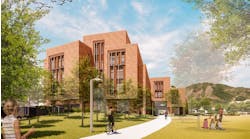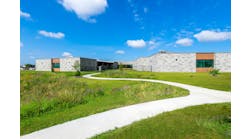Colby College in Waterville, Maine, says that it has achieved carbon neutrality on campus two years ahead of its target date.
The college, a liberal-arts institution with 1,825 students, attributes its faster-than-expected success in reaching its environmental goals to a new biomass plant that enables Colby to generate much of its energy from sustainably harvested wood instead of heating oil.
“This milestone is part of a much larger, and very significant, commitment by the College to sustainability and environmental education,” Colby President William D. Adams says in a news release.
In 2008 Colby became the fourth institution to sign on to the American College and University President’s Climate Commitment (ACUPCC) to pursue carbon neutrality—generating no more carbon emission than is put back into the environment.
Colby’s biomass plant went online in January 2012. The college says the $11.25 million plant generates steam for heating buildings, hot water, cooking and cogeneration of electricity by burning low-grade, sustainably harvested wood mass including treetops, branches, and trees cut in thinning operations. The biomass comes from forestry operations within 50 miles of the campus.
Colby’s 2010-11 Sustainability Report stated that in 2010, 69 percent of the college’s greenhouse gas emissions came from heating fuels. The biomass plant has enabled Colby to eliminate those emission. The energy from the biomass replaces almost 1 million gallons of heating oil per year—90 percent of the 1.1 million gallons that Colby had been consuming.
The U.S. Green Building Council awarded the plant LEED gold certification earlier this year.
Other steps Colby has taken to reduce greenhouse gas emissions on campus:
- A switch in 2013 to 100 percent renewable electricity.
- Increased energy efficiency and lower temperatures in buildings.
- Campus construction and renovation projects designed and built to achieve LEED certification; since 2005, Colby has sought a minimum of silver LEED certification. It has achieved LEED certification on eight projects and has five others registered for certification.
- Geothermal heating and cooling in two new buildings.
- Improved waste management, composting and recycling.
The college says a small portion of its savings on energy costs is used to buy carbon offsets to cover difficult-to-avoid emissions such as college-related travel and commuting. Colby says it plans to continue to reduce emissions through more energy-efficiency upgrades, through education encouraging changes in individuals’ behavior, and through leadership in taking steps that other institutions may follow.

